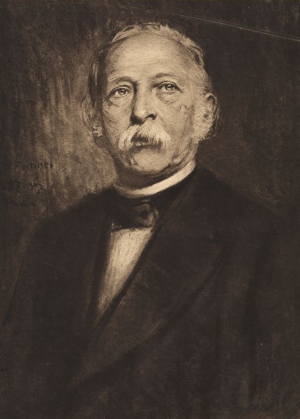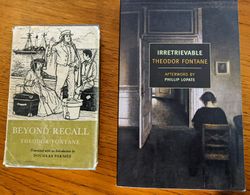Theodor Fontane
Theodor Fontane was a 19th-century German-language novelist whose works are still widely read in German but have been but little available to English-speaking readers. Fontane lived most of his life in Berlin, capital of Bismarck's newly-unified, thriving Germany. After years of successful journalism and travel writing, Fontane began writing novels in his late fifties and produced a novel every two or three years until the end of his life[1]. Several of these later works are considered masterpieces. No one has expressed the enduring public appreciation of Fontane's work better than Phillip Lopate, who wrote: "The novels of Theodor Fontane (1819-1998) are so sparkling, polished, tender, sympathetic, delicately ironic, and psychologically astute that it is a wonder they are not better known by American readers."[2]
Fontane is known as a writer of realism, not only because he was conscientious about the factual accuracy of details in fictional scenes, but also because he depicted his characters in terms of what they said or did and refrained from overtly imputing motives to them. The world of these novels is one in which everyone seems powerless, constrained by convention if nothing else. The novels delve into topics that were more or less taboo for discussion in polite society of Fontane's day, including marital infidelity, class differences, urban vs. rural differences, abandonment of children, and suicide. His characters range from lower-middle class to Prussian nobility.
Fontane's novels are especially challenging to translate, because (for example) they may contain subtle, lyrical linguistic motifs, some of which are as clear in German as the famous musical motifs in Prokofiev's Peter in the Wolf, but which do not render equivalently into in English.
Lastly, these are not action novels. Some have been called novels of manners, and impatient readers may find the plot slow-moving. Character is often developed through a series of seemingly insignificant, everyday events; yet, there are no sentences or details which can be considered superfluous to the story's eventual shape.
English translations for the more famous works.
This is still very incomplete, for now.
Unterm Birnbaum, 1885 ("Under the Pear Tree")

This still popular novella, first published in 1885, is a crime story, where almost from the outset, the reader knows that a murder is planned and carried out, and by whom. A village merchant and his wife, over the years, have fallen gradually into serious debt, and the person sent to collect the amount due disappears. The details of the crime remain untold, while the narrative focuses on what others think happened, how a small town's community opinion vacillates over time, and how the community opinions affect the perpetrators. The reader cannot easily predict whether they will ever be caught. As with some other of Fontane's best works such as Effi Briest and Beyond Recall, the plot was patterned roughly around a real event reported years before the novella was written and that Fontane had read about. The majority of the novel consists of richly nuanced conversations among the town's denizens about the married couple at the center of the controversy.
There is at least one English translation:
- Under the Pear Tree translated by Patricia Tiney; Huddersfield : Belgarun, 2009 (print-on-demand)
Irrungen, Wirrungen, 1888 ("Blunders and Confusion")
This novel is about an affair between a wealthy officer and a lower-middle-class Berlin girl. Some English translations exist:
- Delusions, Confusions translated by William L. Zwiebel, ISBN-13: 978-0826403261
- Trials and Tribulations (1888)
- On Tangled Paths - translated by Peter James Bowman; Penguin reprint (June 6, 2013), 189 pages.
Die PoggenPuhls, date?
(description tbd). At least one English translation has been made:
- The Poggenpuhl Family translated by Gabriele Annan, ISBN-13: 978-0826403261
Unwiederbrichlich, 1891 ("Not Recoverable")
Reams have been written about this book, and it has been televised and made into movies (in German) more than once. Like other of Fontane's works, the plot of this haunting novel is based upon an actual event which he read about in a newspaper. It takes place in Holstein in 1859-1861, five years before the German/Danish war, and is the story of a troubled marriage. The novel was long inaccessible to English readers, though the German text is now available free for electronic readers. The novel has linguistic motifs in the same way that "Peter and the Wolf" has musical motifs, presenting a particular challenge to translators, but by now, multiple English translations exist. Three different, perfectly plausible translations have been used for the title, which has a literal meaning of "Unbringbackable". It could just as easily have been translated as Gone with the Wind, had that title not already been attached to a different author. The translations to English are:
- Beyond Recall[4] translated by Douglas Parmée; London, Oxford University Press, 1964 (out of print)
- Irretrievable[5] translated by Douglas Parmée; London, Oxford University Press, 1964 (out of print)</ref> translated by Douglas Parmée; reprint of the above but with a title change, New York Review of Books, 2011
- No Way Back, translated by Hugh Rorrison and Helen Chambers; Angel Classics, London, 2010 (availability?)
The novel's plot is deceptively simple: a religious and serious-minded woman marries a responsible but light-hearted nobleman, they have two kids and live by the sea peacefully for years, until the husband is suddenly called to attend the court in Copenhagen. The husband becomes infatuated with a young woman at court and leaves the wife (only to be rejected immediately by the young woman). Husband and wife eventually reunite, but soon afterwards, she commits suicide.
Frau Jenny Treibel, 1892
This novel is about attempts by a schoolmaster's daughter to marry new wealth.
- tbd
Effi Briest, 1894
This novel is about a wronged husband conventionally seeking retribution for a long-past affair. At least one English translation has been made:
- Effi Briest tranlated by Philip Dossick, Griffin Classic Books 2017 (ebook)
Was Fontane anti-semitic?
Some modern scholars have singled out Fontane's works as containing anti-semitic passages, and have gone so far as to withdraw from studying his work in solidarity with what they consider enlightened sensibility. Not all scholars agree about this. If anti-semitism can be discerned in Fontane's fictional works, it could be seen as a reflection of the mainstream views of the society in which he lived. For example, in some novels including "Under the Pear Tree" and "Unwiederbringlich", there is mention of the Jewish heritage of a few key characters, as though this conveyed useful information to listeners (or perhaps readers). But the works themselves do not present any interpretation about the importance of that information, only noting that the characters were aware of it.
Notes
- ↑ Encyclopedia Brittanica on Theodor Fontane, last access 12/1/2020.
- ↑ From Philip Lopate's afterword to Irretrievable by Fontane, translated by Douglas Parmée, New York Review of Books, 2011, p 259. ISBN 978-1-59017-374-9
- ↑ Unterm Birnbaum by Theodor Fontane, an "on demand" printed, special-edition book in German, from the Sammlung Hofenberg, Berlin, 2016. ISBN 978-3-8430-1683-4
- ↑ Beyond Recall (Unwiederbringlich) by Theodor Fontane, Translated with an Introduction by Douglas Parmée. London, Oxford University Press, 1964. Volume 602 in The World Classics, ISBN 978-0192506023
- ↑ Irretrievable (Unwiederbringlich) by Theodor Fontane, Translated with an Introduction by Douglas Parmée. reprint with title change, New York Review of Books, 2011. ISBN 978-1-59017-374-9

